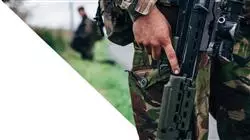University certificate
The world's largest faculty of law”
Why study at TECH?
Delve into the protection systems in Europe, America and Africa that exist today. Enroll now!”

Nowadays, Human Rights are indispensable in order to ensure the protection of people in situations involving Armed Conflicts or Migration Crises. Various national and international organizations have dedicated their efforts to ensure that the established agreements and programs are complied with.
The promotion of justice, equality and the protection of the most vulnerable remains a constant challenge in a world marked by conflict and forced displacement.
With this in mind, TECH has designed this academic program in collaboration with an excellent group of experts with the aim of providing in-depth knowledge in this area. First, a comprehensive analysis of the protection systems in Europe, America and Africa will be carried out, as well as the formal mechanisms for the protection of rights currently in place. Then, the causes of migration flows and crises will be studied in depth, and the refugee statutes as a universal protection regime will be addressed.
Finally, the students will be invited to carry out an in-depth analysis of the interaction between international humanitarian law, States and international organizations, the regulations that govern it and the various impacts and effects on international human rights law.
All the content of this program is available 100% online, which will allow students to download and review it whenever they need it. In addition, it is important to note that this allows students the freedom to study at their own pace and without time restrictions. In this way, students will not have to sacrifice their personal or professional responsibilities to complete this program.
Thanks to this program you will analyze the differences between the protection of Human Rights in times of peace and during Armed Conflicts"
This Armed conflicts and Migration Crises in Armed conflicts and Migration Crises contains the most complete and up-to-date program on the market. The most important features include:
- The development of case studies presented by experts in the legal field
- The graphic, schematic, and practical contents with which they are created, provide practical information on the disciplines that are essential for professional practice
- Practical exercises where the self-assessment process can be carried out to improve learning
- Its special emphasis on innovative methodologies
- Theoretical lessons, questions to the expert, debate forums on controversial topics, and individual reflection assignments
- Content that is accessible from any fixed or portable device with an Internet connection
Enroll now! Develop specialized knowledge on international humanitarian law"
The program’s teaching staff includes professionals from sector who contribute their work experience to this educational program, as well as renowned specialists from leading societies and prestigious universities.
Its multimedia content, developed with the latest educational technology, will provide the professionals with situated and contextual learning, i.e., a simulated environment that will provide an immersive education programmed to learn in real situations.
The design of this program focuses on Problem-Based Learning, by means of which the professionals must try to solve the different professional practice situations that are presented throughout the academic course. For this purpose, the students will be assisted by an innovative interactive video system created by renowned experts.
Learn with the best experts and specialize in Human Rights"

Prepare yourself to work in international organizations thanks to this Armed conflicts and Migration Crises"
Syllabus
This academic program has a complete and updated syllabus that deals in depth with the crucial challenges in the field of Human Rights and the migratory crisis. Therefore, students will delve into topics such as the European Convention on Human Rights and its protocols and the requirements to apply for political asylum in Asia, America and Europe. This will provide a comprehensive understanding of the current challenges posed by this global issue.

Now is the time to take a new step in your career and prepare yourself to access new job opportunities in international organizations"
Module 1. International Human Rights Protection Systems of a Regional Nature
1.1. Universalism versus regionalism in international protection of Human Rights
1.1.1. International protection system on the European continent
1.1.2. International protection system on the American continent
1.1.3. International protection system on the African continent
1.2. International organizations for the protection of human rights on the European continent
1.2.1. The European Convention on Human Rights and its Protocols
1.2.2. Other human rights conventions adopted within the framework of the Council of Europe
1.2.3. The European Court of Human Rights (ECtHR): jurisdiction, structure and organization
1.3. International organizations for the protection of human rights on the American continent
1.3.1. Historical context of their creation
1.3.2. The normative instruments of the inter-American system
1.3.3. The rights and freedoms recognized
1.4. International organizations for the protection of human rights on the African continent
1.4.1. Historical context of their creation
1.4.2. The normative instruments of the inter-American system
1.4.3. The rights and freedoms recognized
1.5. International tribunals in regional systems for the protection of Human Rights
1.5.1. The African Court of Human Rights.
1.5.2. The Inter-American Court for the Protection of Human Rights
1.5.3. The European Court for the Protection of Human Rights
1.6. International protection of human rights protection and international integration organizations
1.6.1. In the framework of Mercosur
1.6.2. In the framework of the European Union
1.6.3. Other integration systems
1.7. Complaints procedures and value of the judgments of international tribunals
1.7.1. The complaints procedure and value of ECtHR rulings
1.7.2. The complaints procedure and value of judgments of the IACHR
1.7.3. The complaints procedure and value of the judgments of the IACHR
1.8. Initiatives and challenges for the protection of Human Rights in the East
1.8.1. Asian perspective of Human Rights protection
1.8.2. ASEAN Intergovernmental Commission on Human Rights
1.8.3. Initiatives and challenges for the protection of Human Rights in Asia.
1.9. The protection of Human Rights in the Arab-Islamic World
1.9.1. Protection of Human Rights in the Arab-Islamic World
1.9.2. The normative instruments of the inter-American system
1.9.3. Reception of the international standard on the protection of Human Rights
1.10. The International Criminal Court and other international criminal tribunals
1.10.1. The International Criminal Court and other International Criminal Tribunals
1.10.2. Composition
1.10.3. Functioning
Module 2. Migratory flows and Human Rights
2.1. International migration flows
2.1.1. The international organization of migration
2.1.2. International trends
2.1.3. Interaction of migration flows with other global challenges.
2.2. The right to seek and receive asylum
2.2.1. Historical origins
2.2.2. Emergence and evolution of diplomatic asylum
2.2.3. Crystallization of asylum as a human right in international instruments
2.3. The international application of asylum in the world
2.3.1. The right to seek asylum and its application on the European continent
2.3.2. The right to seek asylum and its application on the American continent.
2.3.3. The right to seek asylum and its application on the African continent.
2.4. Refugee status as a universal protection regime
2.4.1. International categories of protection
2.4.2. New challenges: LGTBIQ+ community protection
2.4.3. New challenges: climate change and disaster displacement
2.5. International migration and asylum policies
2.5.1. Origins
2.5.2. Migration crises and political impulses
2.5.3. Competencies in international integration organizations
2.6. Integration processes: Freedom of movement and borders
2.6.1. Freedom of movement
2.6.2. The Schengen area
2.6.3. Re-establishment of internal borders in the framework of the Schengen area
2.7. Agencies and border control
2.7.1. European border control agencies
2.7.2. European agencies guaranteeing the protection of DDFF
2.7.3. Cooperation between European and national agencies
2.8. External dimension of external border control
2.8.1. European Union and neighboring countries
2.8.2. European Union and third countries
2.8.3. European Union and Latin America
2.9. Border Control and Human Rights
2.9.1. European Union and European system of human rights protection
2.9.2. Responsibility of European agencies
2.9.3. International jurisprudence and relationship between international tribunals
2.10. Combating the smuggling of migrants in international society
2.10.1. International organized crime situation
2.10.2. International instruments
2.10.3. Regional instruments
Module 3. Armed Conflict and Human Rights
3.1. International Humanitarian Law
3.1.1. War Humanitarian Law (ius in bello)
3.1.2. International Humanitarian Law (IHL)
3.1.3. Jus contra bellum
3.2. Basic rules and principles of International Humanitarian Law (IHL)
3.2.1. Principle of humanity
3.2.2. Principle of distinction
3.2.3. Principle of limitation
3.3. Protection of victims through the regulation of the conduct of hostilities
3.3.1. International armed conflicts
3.3.2. Non-international armed conflicts
3.3.3. The evolution of the types of conflicts
3.4. Protection of the various categories of victims through their identification
3.4.1. Wounded and sick
3.4.2. Castaways
3.4.3. Prisoners of war and civilian population
3.5. Protection of particularly vulnerable victims and assets
3.5.1. Women and children
3.5.2. Refugees, displaced persons and journalists
3.5.3. Cultural property and environment
3.6. The IHL effectiveness system
3.6.1. International Instruments
3.6.2. Analysis of the reception of international instruments
3.6.3. Practice
3.7. War crimes and international criminal responsibility of the individual
3.7.1. Origins
3.7.2. Evolution of its regulation
3.7.3. International tribunals that sanction with jurisdiction to judge war crimes.
3.8. Limitations on the use of certain weapons in hostilities
3.8.1. The St. Petersburg Declaration of 1868
3.8.2. Hague regulations and customs
3.8.3. The Geneva Conventions and Additional Protocol I
3.9. The environment and IHL
3.9.1. The General Principle of Environmental Protection
3.9.2. Environmental Law and its application
3.9.3. Other international conventions
3.10. International Red Cross Movement
3.10.1. Red Cross and Red Crescent
3.10.2. Principles of the Red Cross Movement
3.10.3. International Committee of the Red Cross

A Postgraduate diploma at the forefront of current Human Rights issues. Enroll now!”
Postgraduate Diploma in Armed Conflict and Migration Crises
Would you like to deepen your knowledge in the field of armed conflicts and migration crises? The Faculty of Law at TECH Global University gives you the opportunity to delve into this fascinating field through a Postgraduate Diploma taught in online mode. This program, designed by internationally renowned specialists, will equip you with crucial skills to understand and address global challenges. Throughout the program, you will explore in depth the roots of armed conflicts and the dynamics of migration crises, acquiring a comprehensive and up-to-date perspective. The teaching team is made up of professionals with extensive experience in the field, who will guide you in your learning and provide you with an enriching vision of these complex issues. You will be able to interact with them on a continuous basis, taking advantage of their knowledge and experience.
Learn about all the possibilities this area has for you
By completing this program, you will obtain a certificate that will open doors for you in the working world. You'll be ready to apply your knowledge in international organizations, government agencies, NGOs, the media and other institutions engaged in conflict resolution and migration crisis management. In addition, you will learn with an institution recognized for its academic excellence and its focus on guiding professionals committed to positive change in society. The goal is for you to become a subject matter expert and contribute to effectively addressing conflict and migration situations. Take the opportunity to specialize in a crucial field of study for today's world. Are you ready to acquire the skills that will make you a specialist? Enroll now in the Postgraduate Diploma in Armed Conflict and Migration Crises and get ready to make a difference on the global stage.







